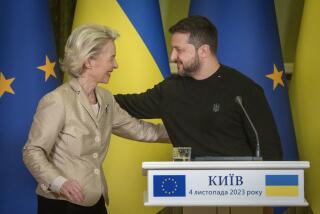European Conference Adds 5 Ex-Soviet Asia Republics
- Share via
PRAGUE, Czechoslovakia — In a gesture meant to encourage the Muslim regions of the former Soviet Union to look toward the West for their future, the nations of Europe admitted the five republics of Central Asia into the Continent’s largest diplomatic body.
The 38-nation Conference on Security and Cooperation in Europe, which includes every European country plus the United States and Canada, decided unanimously to grant membership to 10 new nations carved out of the former Soviet Union.
The action stretched the definition of “Europe” to include distant Central Asian countries--Kazakhstan, Kyrgyzstan, Tajikistan, Turkmenistan and Uzbekistan--whose capitals are more than 1,000 miles east of the Ural Mountains, the traditional dividing line between Europe and Asia.
A senior West European diplomat said the decision was intended to help entice the Muslim republics toward Western-style democracy--and away from Iranian-style Islamic fundamentalism.
“These republics are caught between the Western World and the Muslim world,” he said. “We don’t want to push them in the wrong direction.”
Initially, some CSCE countries argued that only the European republics of the former Soviet Union should be invited to join. But Germany and other Western countries argued that the Central Asians would feel deliberately snubbed if they were left out.
And they argued that the Central Asians were already being wooed by neighboring Iran, which has moved quickly to establish ties with the Muslim republics.
“The Soviet Union was a member of CSCE in its entirety,” German Foreign Minister Hans-Dietrich Genscher said. “So everything argues in favor of including the states that have followed.”
Secretary of State James A. Baker III, who briefly attended a CSCE meeting in the Czechoslovak capital on his way to New York from Moscow, said the organization can now work on promoting democratic practices “across the Eurasian landmass.”
The CSCE meeting also granted membership to the former Soviet republics of Ukraine, Belarus, Moldova, Armenia and Azerbaijan, bringing total membership in the organization to 48 countries.
The group did not formally grant membership to Georgia, which has been racked by civil war, because it did not ask to join. But diplomats said Georgia would qualify as soon as its internal crisis is over.
Russia had already won membership by taking the Soviet seat.
The foreign ministers also agreed to give observer status at CSCE to Croatia and Slovenia, two republics that have declared independence from Yugoslavia.
The two-day meeting was also scheduled to discuss ways in which the CSCE can be more effective in mediating disputes among European countries.
Czechoslovak President Vaclav Havel opened the meeting with a call for strengthening the organization by giving it an “executive body” similar to the U.N. Security Council that could send peacekeeping forces to intervene in European conflicts.
Baker had no reaction to that idea, but another U.S. official said he expects that the Bush Administration would have little enthusiasm for the idea of placing NATO forces under CSCE command.
But European countries said they want to make CSCE more effective in mediating such disputes as the war in Yugoslavia.
Diplomats said Havel’s proposal, and other ideas for strengthening CSCE, will be discussed at a conference in Helsinki in March.
More to Read
Sign up for Essential California
The most important California stories and recommendations in your inbox every morning.
You may occasionally receive promotional content from the Los Angeles Times.











